Of all things, the bins on his street in eastern Sydney have become significant in the life of Tim Robards. Why? Because they’re a marker of time, And time has become precious to him. “You know, I walk past them, and I see the bins have gone out, and I think, That’s another week,” says Robards. In the ensuing fortnight it’s, “There are the bins out again… And there they are again. They’re a constant reminder of another week down. And it scares me.”
An approaching milestone birthday – Tim Robards turns 40 on the 1st of October – has intensified this dread of time slipping away while there’s still so much to do. The clock’s ticking – and every tick is a miniature explosion in his head.
It hasn’t helped that, of late, his famously cover-worthy body has been breaking down more than it used to, buckling under the weight of stressors it might once have absorbed. He rattles off his most recent injuries: a hamstring, ripped off the bone; a biceps, same thing; and the last one, a rectus femoris (quadriceps muscle), torn at the start of a touch-footy game.
“I didn’t get the chance to do a proper warm-up,” Robards recalls. “I managed a couple of leg swings, a couple of high knees, and at my age that’s not good enough. Suddenly, the ball was coming my way… there was a gap… a full-field 100 per cent sprint… and pop.” He ended up having the tear surgically fixed because he wasn’t prepared to stop sprinting as a concession to ageing. And he’s proud of his rehab: the doc said he’d be in a knee brace and on crutches for six weeks post-op; Robards tossed them after one. “I wouldn’t advise that for everyone, but because of my chiropractic background, I knew how to protect it.”
Tim Robards chats with Men’s Health on the balcony out back of The Boathouse restaurant in Sydney’s Rose Bay. It’s a pristine winter’s morning and the harbour behind us is glistening in the sunshine. Defying the chill in a T-shirt, Robards looks a million bucks. Watching him sipping his soy cappuccino, you’d reckon he wouldn’t have a worry in the world. But being flesh and blood (with his sights set on a goal that may or may not be reachable), he does have worries, of course – and doubts – and they gnaw away at him.
The difference between Robards and many of us, perhaps, is that he’s intent on doing everything in his power to become what he wants to be: a big-screen actor of consequence. Maybe, ultimately, he won’t quite make it. He accepts that. But it won’t be for want of trying – or for want of a plan. He keeps hitting obstacles – mainly casting directors who see, in Robards, a handsome reality-TV regular rather than the accomplished actor he believes he can be. But he won’t quit.
“No one sees the work that I’m doing behind closed doors,” he says. “I’m working my butt off to be so good that they can’t say no.”
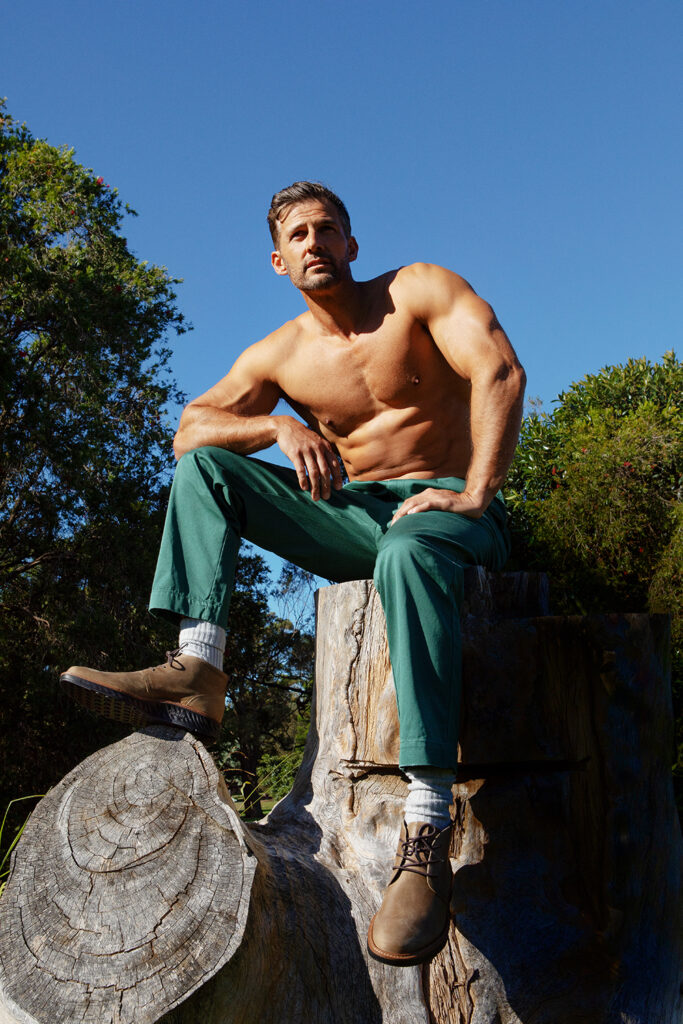
TURNING POINT
You ask Tim Robards how he feels about nearing 40.
“Whoa, yeah… hmmm,” he says, before falling silent. And straight away, from a solid base, your respect for the guy goes up a notch, because he’s doing you the courtesy of thinking, processing his feelings rather than pressing play on a stock answer.
“Should I use the term midlife crisis? Very mixed feelings,” he says at last. “Part of me just keeps kind of… there’s a little bit of a freak-out, you know? Because in my head, I’m still 25.”
Back in 2012, Robards was approaching an earlier milestone – 30 – while logging absurdly long hours as a chiropractor across three Sydney clinics. The physicality of the work, combined with a sense of financial stagnation, had unsettled him. To get to the point, an unusual offer arrived: the chance to star in the first series of The Bachelor.
Newly single and assured by recruiters he’d be choosing from 25 of the country’s most wonderful-in-every-way women, Robards said yes. “It was a bloody daunting decision,” he says. He reckoned there was a 50-50 chance the show would turn him into a pariah or a laughing stock. “But, in the end, I had to back myself that my values would come through no matter what the situation I got into. And my parents backed me up on that: ‘You’re honest, you’ve got integrity,’ they said, ‘and that will shine through’.”
Unsurprisingly, Robards had been benignly misled. Of the 25 maidens, he says, perhaps five were potential partners; the rest were what he calls “characters” whose role was to drive the narrative and concoct drama.
Still, for Robards, The Bachelor was a personal and professional watershed. It was there he met lawyer Anna Heinrich, whom he married in 2018, and in 2020 they welcomed a daughter, Elle. The show bestowed on Robards a national profile, which he leveraged to become an online fitness entrepreneur (therobardsmethod.com) and go-to talent for the producers of reality-TV programs (Australia Ninja Warrior, Dancing with the Stars, SAS Australia); he’s also now the face of and ambassador for health and wellbeing giant Swisse’s brand new Swisse Active sports nutrition range. But it was his two-year stint (2018-20) on Neighbours as billionaire businessman Pierce Greyson that illuminated for Tim Robards what he’d like to do for a crust for the next two or three decades.
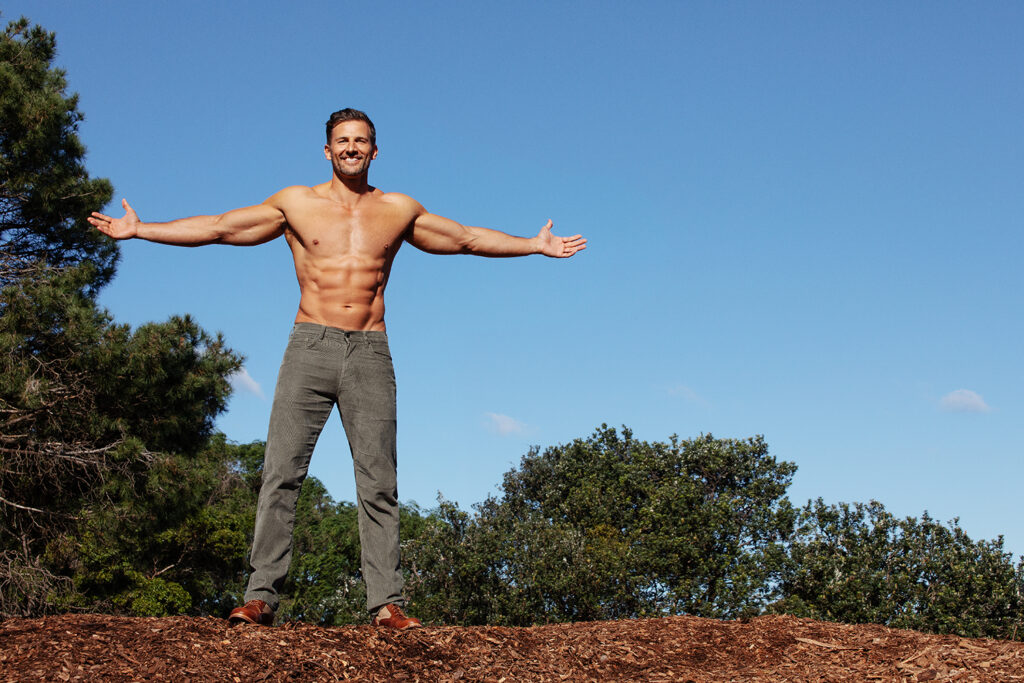
Alas, the frustration of it all!
Since before he arrived on Ramsay Street, Robards has been forking out for acting- and voice-coaching, either in group classes or one-on-one. “It’s not easy going into classes with new people all the time,” he says, “and I sign up for night classes, weekend classes. Look, it’s a lot of learning lines that go nowhere, but that’s part of it. You just want that opportunity. I’m coming in late, and I’m kind of waiting for the next job, and essentially between acting gigs you’re unemployed, so nothing in our lives is secure when it comes to finances.”
Casting directors have been telling his agent that Robards is “too commercial”, a phrase Tim Robards has pondered. What, he’d like to know, does it mean exactly? That he’s too recognisable from other gigs and wouldn’t be believable in character? That he didn’t go through NIDA or WAAPA so would be too raw for serious dramatic roles? That he’s been tainted somehow by his reality-show appearances? “Fortunately,” says Robards, “the problem is not that they’ve seen me [act] and don’t think I’m good enough.”
He’s come to believe that his best chance of breaking through lies in the US, where his clean-cut look would seem to be more in-demand than it is in Australia. Here, he says, film and TV producers tend to prefer more lived-in faces to fill grungier roles in darker productions. If he were single and in his 20s, he says, it would be a “no-brainer” to make the all-or-nothing leap to LA – to jump off the proverbial cliff and hope to grow wings on the way down. But that’s not a responsible option for a young father. And, anyway, nowadays, a lot of auditioning can be done remotely from the other side of the world. It’s just that wretched ticking clock that’s making him nervous.
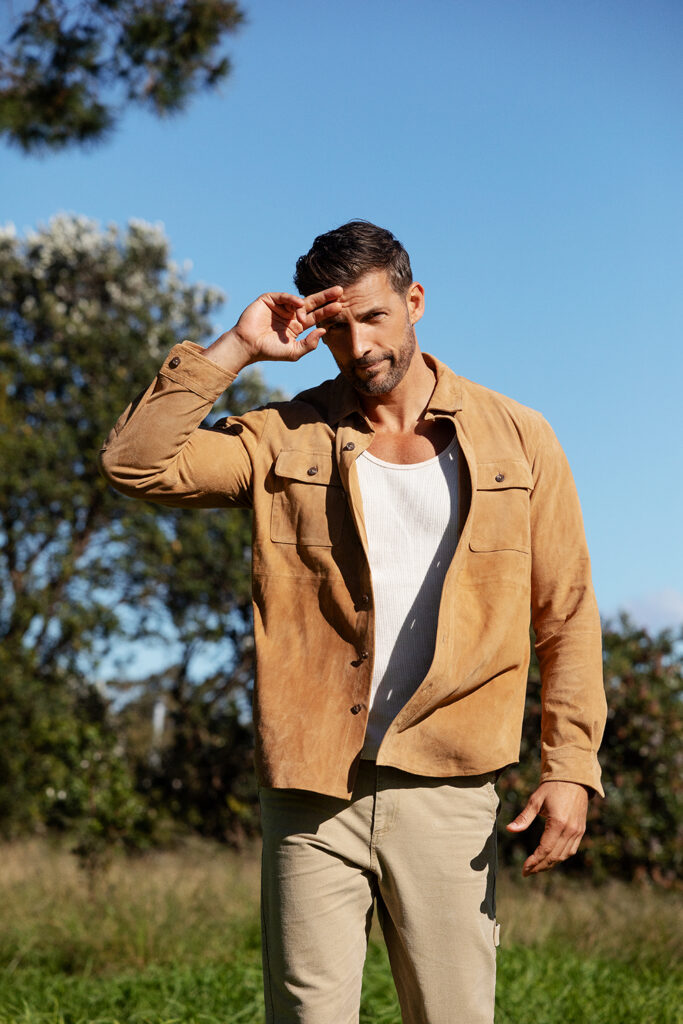
BY THE LOOK OF THINGS
It’s odd to hear a guy as striking and ripped as Robards talking about his looks as a limitation. Wanting to keep it real, you ask him when he first realised that his appearance gave him a certain… power.
His response is to tell a roundabout and thoroughly endearing story about growing up in Newcastle, where, as a bright Year 7 student at Lambton High School, he yearned to try out for the rugby league team but doubted he was strong enough to play. So, he started using his mum’s modest gym set-up at home, lifting weights most nights until, by Year 8, he’d added several kilograms of muscle to his frame, enough to try out for the team and make it as centre/winger renowned for his rugged and fearless defence.
Then, aged 14, something happened. Already fitted with braces for his teeth, a few pimples appeared on his face. His mother, Tanya, took him to a salon, where a beautician prescribed an ongoing course of marine ampoules. Robards believes those ampoules turned those few spots into a stubborn outbreak of cystic acne.
“I had to back myself that my values would come through no matter what”
“I did not feel like a good-looking guy at all,” he says. “I felt like the ugliest guy in the school. Imagine talking to girls, not knowing if one of your pimples has busted and you have pus on your face. There’s nothing more confidence-killing than having to keep touching your face to check whether it’s burst open.” When it came to self-improvement, he reasoned, “the only thing I could do, the only thing I could work on, was my physique.”
As it happened, Robards became a regular reader of Men’s Health (we tell you this only because it’s important to his story, not to self-promote – promise). Unlike the muscle-monsters featured in body-building magazines, the MH cover guys inspired him; he wanted his physique to look like theirs when he was grown up, and he reckoned that was possible if he kept training intensely and consistently. In the meantime, he figured, his workouts would keep him robust enough for footy. “Men’s Health was the only reference and inspiration I had,” he says, “apart from the odd Arnold Schwarzenegger movie.”
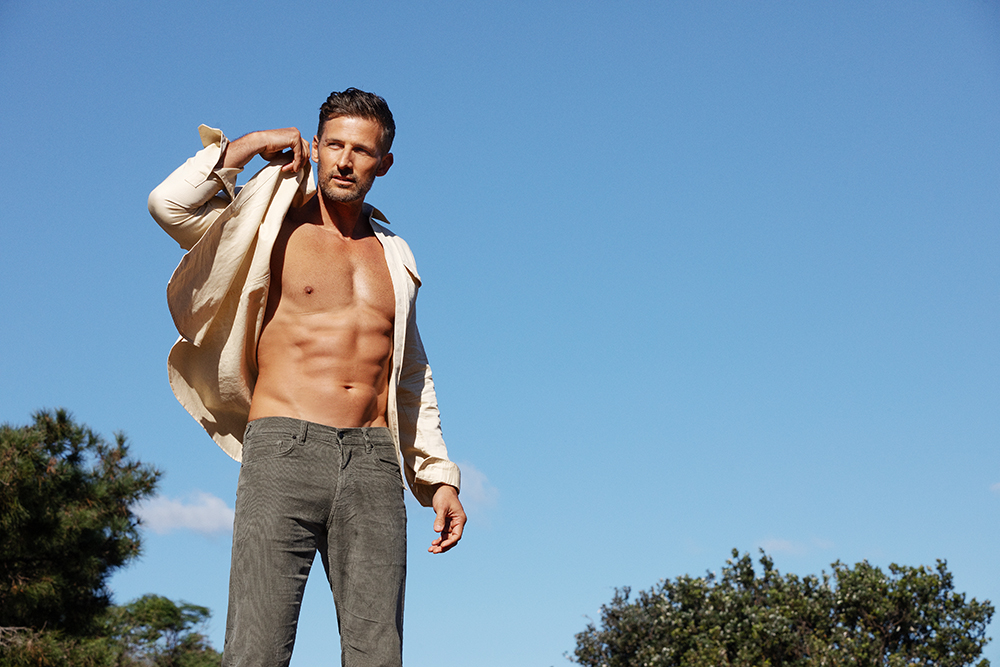
By the time he reached senior school, Robards’ braces were gone, his face had cleared up, and he’d sculpted his body into a teenage work of art. “And suddenly, I had one of the cutest girls in the year wanting to date me. I was like the nerdy guy who went through the ugly-duckling phase and came out all right.”
For Robards, the whole experience was a multifaceted lesson. Firstly, it showed him the value of focusing on those things you can change (in this case, his body) and learning to live with the stuff you’re stuck with for now (braces, problem skin). “At that stage, I was pretty much the only guy I knew who was training with weights. It was my little secret weapon.” Secondly, he realised that the patience, discipline and dedication he’d developed by pumping iron could be applied to other facets of his life. Recently, his iron-forged mental strength has helped keep him upbeat while plugging away at acting. “Because, day by day, you do these shitty little scenes and auditions – and you suck – but you know that if you put the work in day after day after day… you just have to trust that, down the track, the results will be there.”
Here’s another point about Robards’ frog-to-prince tale: because he’s lived the flip side of head-turning looks, he seems to have none of the smugness you detect in those who’ve been lifelong heartbreakers.
“I know I’ve got certain looks and it helps with things,” he says, “but at the same time I don’t ever want to rely on those. I hope it’s a mixture of everything that people find inspiring. I would so much rather get a compliment about the way I made someone feel as opposed to how I look. ‘You inspired me on Ninja Warrior…’ – that, to me,
is worth 50 times someone going, ‘Oh, you’re gorgeous – can I get a photo?’”
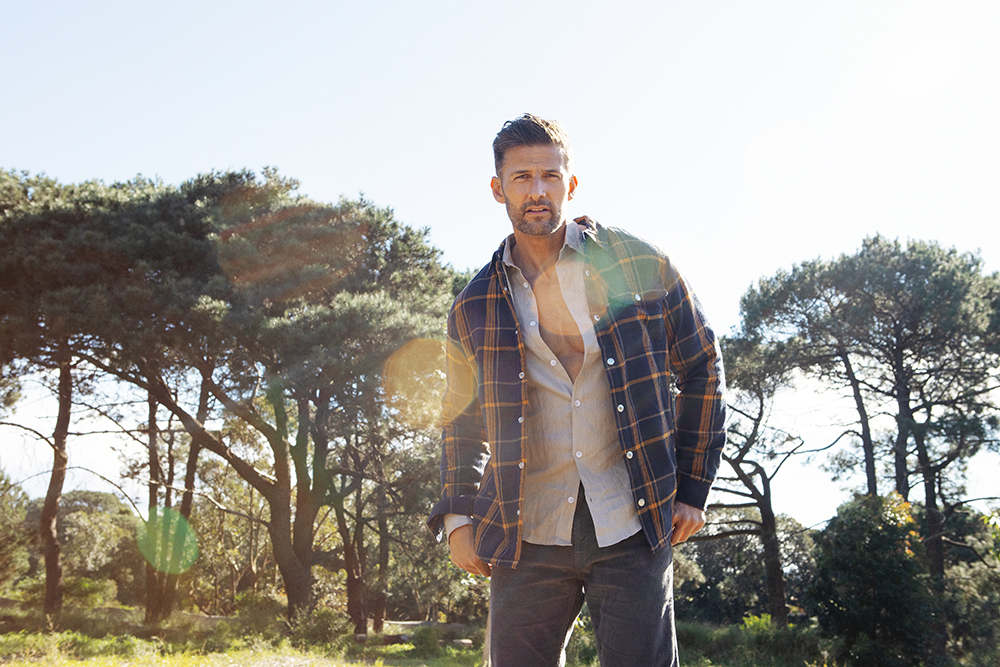
That said, he feels some pressure to maintain his appearance. While he’s never, he says, had any substance injected into his face, he does get a facial now and then. And he dyes his hair and beard to keep the greys at bay, though this is a “professional necessity”: he reckons he’d struggle to land a role as a thirtysomething were he a grey fox. As for his rig, he says he’s never touched a steroid and never would: he would like to inspire young guys the way the MH cover models of yesteryear inspired him; he wants to show that physiques like his are achievable via nothing besides hard work and strict nutrition. “Yes, I’ve got certain genetics, but I’ve also worked my arse off,” he says. “People say, ‘How long have you been training for?’ My answer is, ‘Twenty-seven years’. When this shoot comes out, that’s the product of 27 years’ training, pushing myself to the limit in the gym.”
“Find what you’re passionate about – and don’t half-arse it”
THE PRIORITY PRINCIPLE
You sense with Robards that as much as he’s craving a break professionally, he’s a family-first guy. The oldest of three children, he was forced to grow up fast after his mum fell ill shortly after giving birth to his brother, James, who’s 11 years Robards’ junior. For seven years, she struggled with ME/CFS, the symptoms of which included terrifying-to-witness seizures.
“It was a struggle and a stress, and at the same time it shaped me because I had to find some strength for my brother and sister,” Robards says. “Dad [Colin, an accountant who became the owner of a building company] worked from eight in the morning to seven at night, so I was half-raising the baby while mowing lawns for money from the age of 11.” Young Tim was close to his sprightly maternal grandmother, Doreen, a “sensei” who schooled him in the language of Chinese medicine and the ways of the East. She was central to his burgeoning interest in health – and to his holistic view of it. “There are a lot of things you’ve got to do to be healthy,” he says. “The better underlying balance that you have – your homeostasis – the more likely it is that all these things that are out there to get us will potentially bounce off you. That’s what you want – balance between your various systems – instead of looking for that one magic hit.”
You mention to Robards how he’s still married to the woman he chose on The Bachelor, and that you assume he’s happy. “Yep. It’s a normal relationship, [so] you have your ups and downs, but the thing I remember my dad saying back in the day is that, if you’re ever questioning [your relationship], the simple thing you come back to is, do they bring you up or do they bring you down? And Anna brings me up. There aren’t too many people you can say, hand on heart, bring you up.”
You ask him what, as a father, he’d like to do just as well as his own dad did, and something he’d like to do better for Elle’s sake. He cites his dad’s work ethic and can-do approach, and how he practised what he preached. On the other hand, he says his dad had a relatively narrow take on how you make it in this world: study hard, go to university, find a career.
“I’m a bit more open,” Robards says. “I reckon you find what you’re passionate about, and when you find it, don’t half-arse it. Do your best at it, and if your passion changes, then swap. Do more of what you love in life but commit to it.”
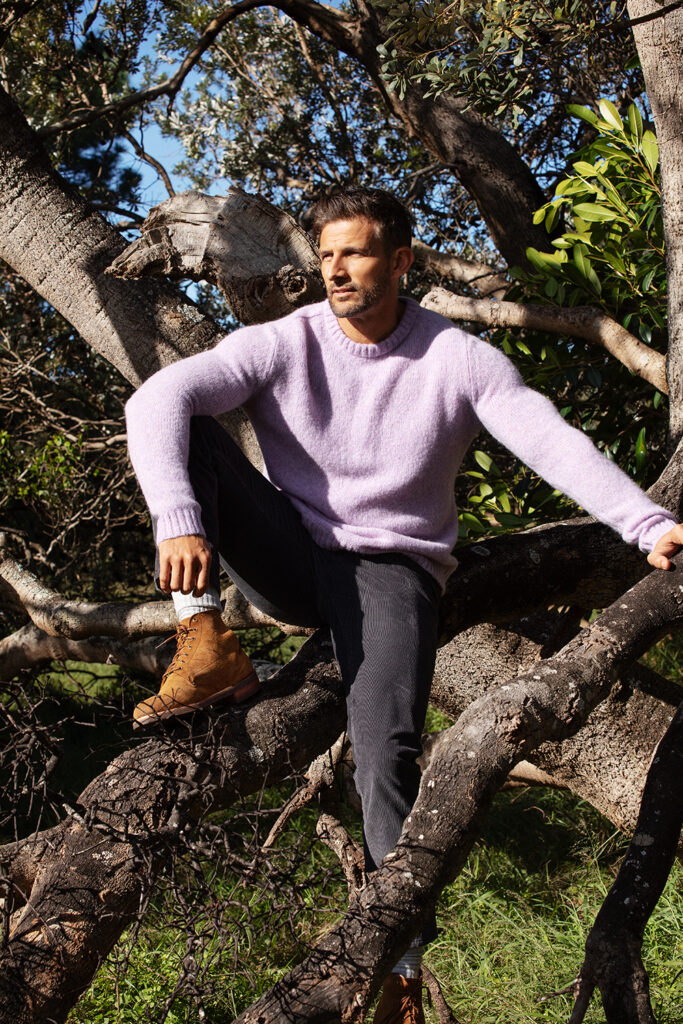
A BETTER MAN
If Robards’ various turns in the world of reality TV are stymying his acting ambitions, that would be spectacularly unfair. While it’s easy to sniff at these shows – at the hype, corniness, silliness – look closer and you’d have to acknowledge that appearing on them takes more mettle than most of us possess. Take Dancing with the Stars:
as a contestant, you’re going to need to work tirelessly to avoid humiliating yourself, and even then, the chance of failure at some level or another is off-the-charts high. Why, you ask Robards, has he taken so many risks? Why not lie down for a while in a comfortable rut?
“I was talking with [SAS Australia instructor] Ant Middleton about this the other day, and he was saying [paraphrasing Dwight Eisenhower], ‘If you’re not progressing, you’re regressing’,” says Robards. “And for me, again, time is of the essence. You’re put on this earth for so many years. If I don’t feel I’m making the most of every single day, then I feel like I’m taking life for granted, that someone else could be doing it better, so give them a chance.”
A chance to prove himself was all Robards hoped to receive from his Neighbours castmates in 2018, when he sensed some of them doubted him – saw him as a pretty-boy impostor. Keen to win them over, he showed them his most serious side, knuckling down to the task of nailing scenes. Looking back, he knows he was green, but also that his skillset expanded exponentially during his stint. “You know, I’m a good learner,” he says. “And when I work hard, I work hard.” If his acting wasn’t enough to change minds and win admirers, he adds, he had a trick up his sleeve in the form of his chiropractic skills, which he used successfully on various Neighbours colleagues when they were wracked by some pain or another.
“I’m a good learner. and when I work hard, I work hard”
If he has a regret about Neighbours, it’s that he didn’t make Pierce Greyson as interesting as he might have been. Citing how Samuel L. Jackson invariably gives his characters an idiosyncrasy – a limp, a lisp, an afro – Robards says that “were I going back in now, knowing what I know, I would probably give [Greyson] more quirks from the start, so then I would have had more to play with.” But feeling his way at the time, “I kept him too simple”.
Even if his screen aspirations are never realised, acting has made him a better person, Robards says. “Because what it teaches you – and this is a great life skill – is to have empathy; to take the time to understand where other people are coming from. Like characters in a show, people – no matter how disagreeable they may seem – rarely if ever view themselves as fundamentally flawed. To them, their behaviour is always justified based on their unique view of
the world.
“So, in everyday life, if I’m struggling to get through to someone, or if I’m in conflict with someone, or I just don’t like someone, I will now say to myself, Okay, we’re obviously headbutting over value systems, so I need to think like they think and see the world through their lens.”
Yep – attitude is everything. All Tim Robards needs now is a way to see those bins without freaking out.
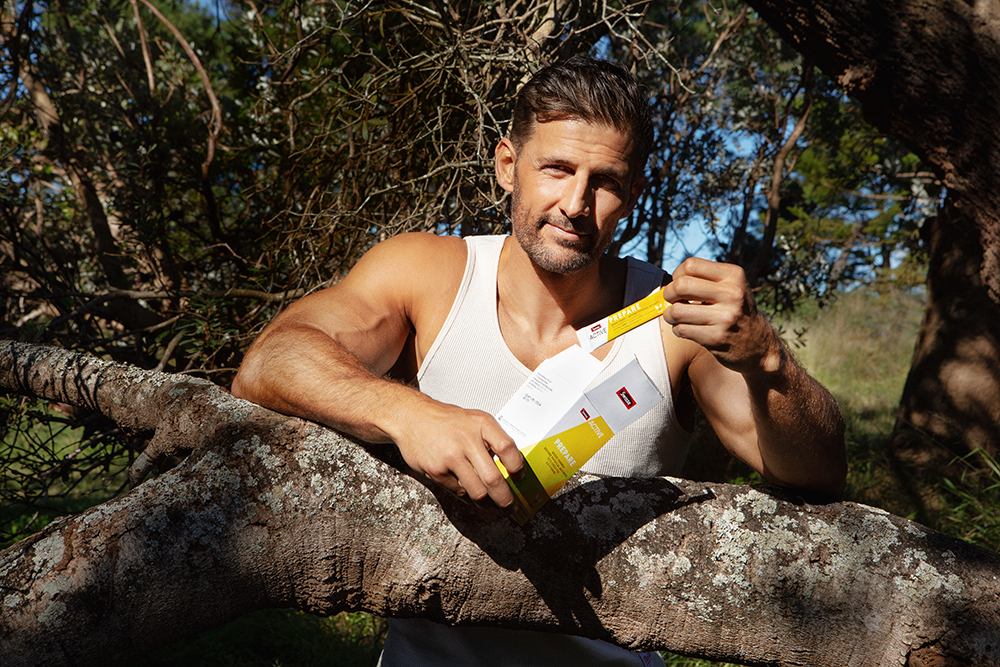
THE TIM ROBARDS WORKOUT
“When I have only 20 minutes to smash a workout, I’ll do a barbell complex,” says Robards, who for this shoot was tipping the scales at 92kg (heavier – read: more muscular – than he’s been for quite a while). Give yourself 5 minutes to do these 6 moves as a superset – 10 reps for each. The time you have left is your rest period. Do 3 rounds. “You’ll be cooked.”
1/ Deadlift
2/ Bent-over Row
3/ Clean
4/ Military Press
5/ Squat
6/ Lunge (10 per leg)
Note: Robards uses a 40kg barbell for the entire circuit. He also uses the new Swisse Active sports nutrition range – pre-, mid- and post-workout sachets – to stay on top of his high-calibre game.
















